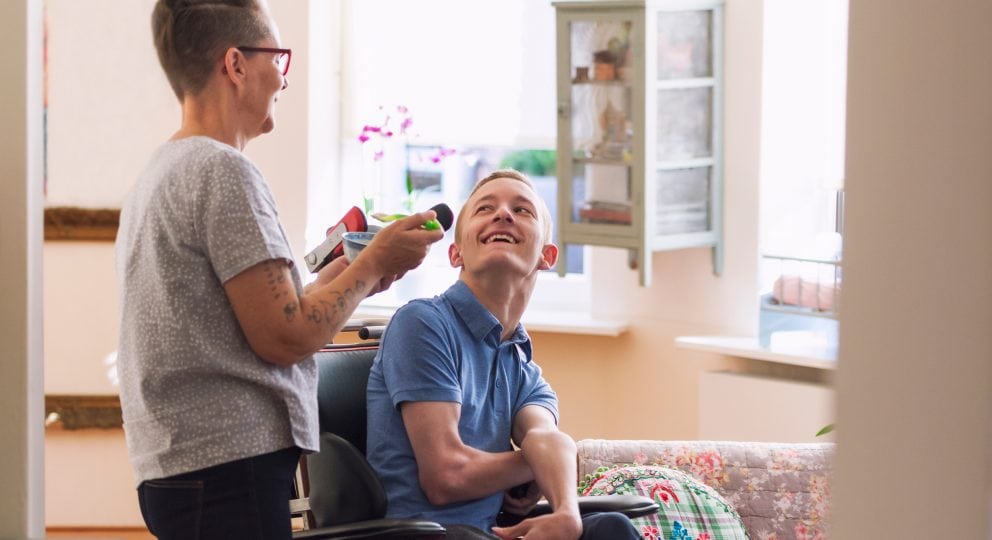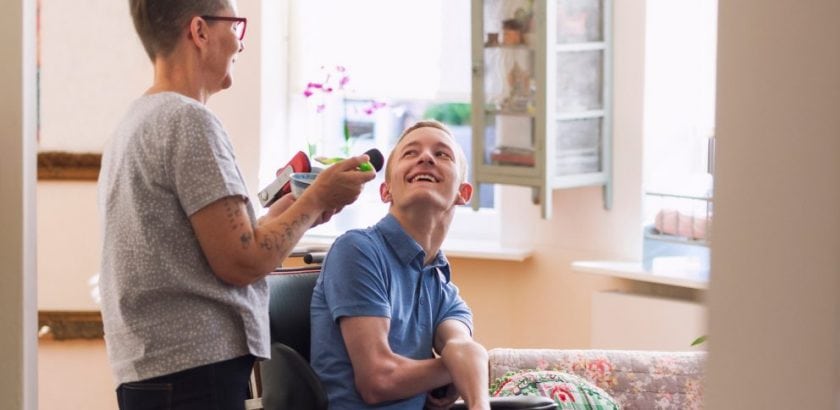Intimate Tickles Thought You Might Be Interested
Published: Wed, 19 Sep 2018 15:29:18 +0000
View Original Article

It’s a given: parenting is hard work. But when you’re raising a child with special needs, the level of care and stress is not just higher—it shifts the foundations of families and adds unimaginable complexities for everyone involved.
Physical disabilities, learning disabilities, illness, Autism, ADHD, Anxiety, OCD, and Developmental Trauma are parenting game changers. At Feeding Futures, we work in the world of exceptional families, so we know all too well how chaotic things can become when you’re caring for a child with special needs. It sounds stressful because it is, and words don’t even begin to do it justice. I know because I’ve lived it.
When my daughter’s Autism diagnosis came, I was new to being a single parent. My emotional reaction was neither pretty nor graceful. Not long after came the news that she also had extreme anxiety and debilitating OCD. The grief that came with each doctor visit was very real. During the slow process of adjusting to a new normal, I became a warrior. And after six years of fighting, I needed a new way forward.
Nobody can prepare you for the emotions that come with parenting special needs children, especially as a single parent. It is full of questions, self-doubt, and eventual acceptance of your situation—a path that should never be seen as a straight line. Each new challenge for my child can trigger old emotions that send me back into the grief cycle, which is full of negative thoughts and less than ideal coping strategies.
What I eventually learned is that I had to make a plan, because at the end of the day, I had a very special child who needed me.
A New Normal for Special Needs
In my work with families, I see special needs parents scrambling to adjust to their new and unexpected role as a healthcare manager for their child. They are prepared to be the catalyst needed to provide an overall positive quality of life for their family, but many are never told how.
Sadly, families receive little instruction on how to best meet the needs of their children without feeding the already toxic levels of extreme family stress. The stress within special needs households is a topic we can no longer ignore.
Here is what I know to be missing in our special needs world: parental self-care. And not normal self-care. We need deep, even radical, self-compassion practices. We are all so concerned about the deficits of our children that no one is looking at the emotional crisis happening in the lives of the parents and overall family.
As parents of special needs children, we need to add ourselves back to the family care list. We actually need to be number one on the list, but I know that’s not always possible for special needs parents. So, if your self-care needs can’t sit at the head of the family care table, you at least need a seat.
Think back to the day the diagnosis came. Were you told to prepare for the grief, recognize your personal stress levels, and strengthen your family relationships as part of your child’s care? Or did you immediately start driving your child to one specialist after another and line up for pharmaceuticals?
These are two very different approaches on many levels. One is void of parental self-care while the other puts parental self-compassion as a necessary part of family-focused care. Sounds radical, even though it shouldn’t be. At Feeding Futures we want parental self-care to be part of the new normal that comes with the special needs diagnosis, and here’s why.
Caregiver Stress Impacts Children
Dr. Stuart Shanker, child psychologist and Founder of The MEHRIT Centre, explains that we’re parenting in an age of toxic stress levels. We are stressed and our kids are stressed. Our bodies and brains are in overdrive all day, every day, and it all flows down into the lives of our children.
In his book Self-Reg: How to Help Your Child (and You) Break the Stress Cycle and Successfully Engage with Life, Dr. Shanker describes a body of research on emotional co-regulation that shows the prefrontal cortex of a child’s brain is not fully developed, so it co-regulates with the prefrontal cortex of significant adults. When an adult is in a stress cycle, the “inter-brain” connection with the child is also full of that stress. Dr. Shanker describes this brain sync up like a “bluetooth” or wireless connection between children and adults. When the inter-brain connection is calm and regulated, stress behaviors are reduced.
There is also polyvagal research from Dr. Stephen Porges and other neuroscientists that’s found when stress is high, we all tip into fight, flight, and freeze more often. This state has substantial long-term health impacts on kids, both typical and with special needs.
Here comes the missing piece that will turn your world upside down, but in a good way. Our children are our mirrors. They show us our stress levels. Each stressful adult day seeps into the nervous system of our children, and they reflect it back to us. Whenever we see a rise in anxiety and stress behaviors in our children, we need to take a good look at our day-to-day lives and our own stress levels. It’s hard to see ourselves as contributing to our children’s challenging behaviors, but the good thing is that it’s never too late to make changes and adopt a softer, more compassionate approach.
The 10% Self-Compassion Promise
Parents of children with special needs require more than just run of the mill self-care practice. They need supercharged, exceptional, and radical self-compassion. I tell parents to imagine they won the “self-care lottery” and they have to use the money on taking better care of themselves or they will lose the prize. Everything about our lives is filled with exceptionalities, and this part of our lives needs to be, too.
I ask families to think how their lives would change if they took 10% of the love and energy they donated each day to their child and gave it back to themselves. Many say they can’t, that it would be selfish, that there is no time. It’s natural that special needs parents are super focused on their children. They have to be. But they also need to care for themselves to avoid the downhill flow of anxiety into their already compromised children. When I remind them of how interconnected stress is within families, they begin to think a little more about a yoga class or going for that swim.
Here are a few things special needs parents can try as they step into the world of exceptional self-care and compassion.
Become a Peaceful Warrior
Special need parenting requires us to fight, so we go at it from a position of a warrior. But what if we come at this type of parenting from a different direction? One where instead of burning through our energy supply like an aggressive warrior, we pause each day and fill our tanks with exceptional compassion towards ourselves. Tell yourself each day that you are doing the job of a giant and that you are doing it well. This I know to be true because I have lived it. You can only be a warrior for so long, then you crash, and no one wins.
“Self-Care Light” Just Doesn’t Cut It
I love spas. I love the music, the muted colors on the walls, the water everywhere, and the services are wonderful. It is a delightful experience, but in my opinion, it is “self-care light.” Like all powerful experiences, we have to go deeper to see changes in our thinking, feeling, and behavior. Sadly, it has taken years for me to figure out this basic fact—leaving the spa and going back into the beehive of a stressful house or busy job is not what I call wise. These days I will keep my hundred dollars of spa money and instead opt for meditation. The Headspace app is a great option.
Learn More About Self-Compassion
Recently, I have taken on a more significant and more in-depth practice of self-compassion. Self-compassion goes deeper than thinking it is nice to buy yourself that expensive thing because you deserve it. It is a deeper daily practice where you learn how necessary it is to cultivate a kind voice in your head. This voice will get you through the dark days, the medical appointments, the IEP meetings, and whatever your exceptional life will toss at you. Self-compassion lives within a soft spot within yourself. It provides you with much needed kind attention, and it is the balance to all the attention you have to give to others.
Know That Compassion Has Two Necessary Parts
I remind parents of a concept I learned though buddhist meditation teacher and author Sharon Salzberg. Compassion has two equally important parts: the part you give to others and the part you must give back to yourself. Parents have no issue with the first part. It’s the second part they can’t get their head around. They have never been taught how to care for themselves or even think it is necessary. But it is, and this is the foundation of helping our children with special needs feel better, too.
Consciously Invite Positives Into Your Life
A wise yoga teacher once taught me the power of inviting positives and joys into our lives, and the reason to do it is more profound than you think. This practice teaches us that when our lives become more positive and balanced, we can reflect and observe that negatives have drifted away or at least don’t take up as much space in our lives. The work of Barbara Frederickson suggests we broaden and build positive states such as gratitude, kindness, compassion, joy, and peace. Try it for a month, see how your life changes, and how the behavior of your children will change, too. Positive begets positive, and joy generates joy, so pause to celebrate the positives, no matter how small they might appear.
So, are you ready? Ready to try something that will benefit your whole family? Start small. Make a list of things you would like to do for yourself, and carve out time to do it. Your family is not ordinary, it’s exceptional. And so are you.
Subscribe below to receive our blog posts directly to your inbox.
